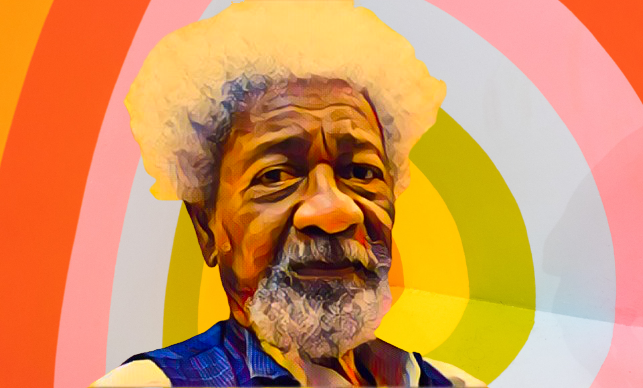Just outside the Kemta Estate gate in Idi Aba, on the outskirts of Abeokuta, the sky is clear and blue, and the air is humid. Nestled in the Autonomous Republic of Ijegba (ARI), high in the hills of Kemta, is a brick house surrounded by forest and birdsong.
This is the home of Akinwande Oluwole Babatunde Soyinka, also known as Wole Soyinka. On this afternoon, a line of children stretches as they eagerly make their way into the forest. They excitedly walk from the open plains, where a couple of buses are parked, into the republic, where no visa is required, no national anthem is sung, and total freedom of expression is allowed.
Inside the amphitheater in the basement of the red brick house, children fill the available spaces, eagerly waiting for the arrival of the “King.” The theater soon echoes with chants of “Kongi! Kongi!” as Soyinka arrives.
For nearly 15 years, Soyinka, or Eniogun, has hosted children from across Nigeria and Ogun State. The Wole Soyinka International Cultural Exchange (WSICE) is celebrating the Nobel laureate’s 90th birthday with a series of events running until the end of July.
Teju Kareem, co-executive producer of WSICE, explains that the mentoring session is one way Soyinka aims to support Nigerian children. WSICE began in 2010 in Lagos with a three-day program when Soyinka was 76 and has since run annually at its permanent home in Abeokuta, with satellite events in other Nigerian states and internationally.
Over 2,000 students and more than 200 adult participants gather annually at the Ijegba Fore-Stage, a creative village near Soyinka’s residence in Idi Aba Housing Estate, Kemta, Abeokuta. The organizers have announced 90 finalists for the 2024 WSICE Essay Competition, featuring talented students from across Nigeria writing on the many lives of Soyinka.
“These finalists have shown exceptional writing prowess, creativity, and insightful perspectives on this year’s theme,” said the jury. The selection process was rigorous, guided by esteemed judges who evaluated submissions based on originality, coherence, depth of analysis, and relevance to the theme.
The essays contribute meaningfully to the broader discourse, offering fresh insights and thought-provoking arguments. This year’s scholarship money and gifts will exceed 10 million Naira, declared Dr. Teju Kareem.
At last year’s event, various speakers, including lawyer and rights activist Dele Farotimi and social worker Ier Jonathan, described Soyinka as a true Nigerian patriot. Farotimi noted, “Nigeria is younger than Prof Soyinka, but it has never known rights, freedom, or justice as he has pursued throughout his life.”
Professor Razinatu Mohammed of the University of Maiduguri also highlighted the systemic corruption within Nigeria’s judicial system, stating that Soyinka has fought for justice since his youth. The lecturer emphasized that Soyinka’s work and activism have been pivotal in addressing these issues.
Born on July 13, 1934, in Abeokuta, Ogun State, Soyinka is a playwright, poet, novelist, essayist, actor, director, filmmaker, memoirist, translator, and singer/songwriter. He is a descendant of the rulers of Isara and was born the second of his parents’ seven children.
Soyinka’s father, Samuel Ayodele Soyinka, was an Anglican minister and headmaster, while his mother, Grace Eniola Soyinka, was a political activist within the women’s movement in their local community. Raised in a religious family, Soyinka attended church services and sang in the choir from an early age but later became an atheist.
Soyinka had his primary education at St. Peter’s Primary School in Abeokuta. In 1946, he was admitted to the Government College in Ibadan, one of Nigeria’s elite secondary schools. After completing his course in 1952, he began studies at University College Ibadan, where he studied English literature, Greek, and Western history. He later continued his studies in England at the University of Leeds.
While at university, Soyinka and six others founded the Pyrates Confraternity, Nigeria’s first anti-corruption and justice-seeking student organization. After graduating from Leeds, Soyinka remained in England and began working on new works that combined European theatrical traditions with those of his Yoruba cultural heritage.
Soyinka’s first major play, “The Swamp Dwellers,” was followed by “The Lion and the Jewel,” which attracted interest from London’s Royal Court Theatre. Encouraged by this, Soyinka moved to London and worked as a play reader for the Royal Court Theatre. His plays dealt with the uneasy relationship between progress and tradition in Nigeria.
Soyinka came to national consciousness with his play “A Dance of the Forests,” which was the official play for Nigeria’s independence celebrations in 1960. The play criticized Nigeria’s political elite and warned against replacing external domination with internal oppression.
Throughout his career, Soyinka has written dozens of plays, including “Camwood on the Leaves,” “The Trial of Brother Jero,” and “Madmen and Specialists.” He has remained a significant figure in national discourse, often confronting power with satire.
Soyinka’s dedication to his art and activism has led to multiple imprisonments and periods of exile. Despite these challenges, he has remained consistent in his criticism of bad leadership and oppression in Nigeria and Africa.
In 1986, Soyinka became the first sub-Saharan African to be awarded the Nobel Prize for Literature. The Nobel Committee recognized his wide cultural perspective and poetic overtones in fashioning the drama of existence.
Soyinka is better known in Nigeria as an activist than a playwright, but his influence on younger writers is undeniable. His works continue to address the clash of cultures, colonial interventions, religious bigotry, corruption, and poor governance.
At 90, Soyinka remains active in national discourse, reflecting on Nigeria’s future and continuing his lifelong fight for justice. His stories and contributions to literature and activism have left an indelible mark on Nigeria and the world. Happy 90th birthday, Wole Soyinka.



